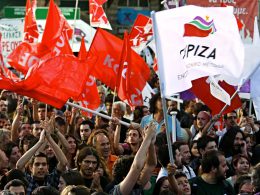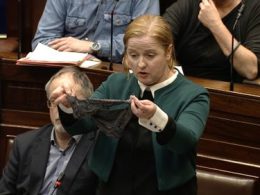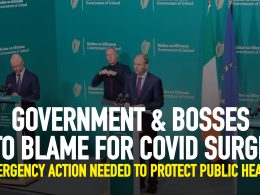By Kevin Henry
This year’s Assembly election was historic, with Sinn Féin emerging as the largest party, the first non-Unionist party to do so in the 101-year history of the state. As Lewis Goodwall, policy editor for BBC Newsnight put it, “Northern Ireland was literally designed, its borders were designed, so that that wouldn’t happen.” The largest political designation in Stormont, however, remains Unionism. The Stormont institutions have since been plunged into a fresh crisis, as the DUP refuses to allow the Assembly or Executive to function without “significant movement on the protocol.” Kevin Henry looks at developments in this election and since, including the crisis around the protocol and the rising tide of workers’ struggles.
Despite being in government for nearly a quarter of a century and being prepared to implement attacks on working-class people, Sinn Féin’s main slogan in the election was “vote for real change”. Towards the end of the campaign, they appealed to voters to elect a “First Minister for everyone”, as they sought to turn the election into a presidential-style vote. But it was neither its clever campaigning nor any enthusiasm for Sinn Féin’s record, but the approach of the DUP, which was seen as intransigent by most Catholics, that gave Sinn Féin its victory.
The other story of this election was the Alliance surge. While most pronounced in Protestant middle-class areas, which are pro-Union but voted against Brexit, Alliance’s vote increased across the board and saw its number of seats more than double. For a section of young people, the Alliance Party is considered to represent a ‘progressive’ break with the politics of Orange and Green.
Far from being progressive, however, Alliance’s record is that of an establishment party which has often been the most enthusiastic about attacking workers and young people — from backing the introduction of the hated welfare reform, to arguing for water charges, to advocating increasing student fees. Most recently, Alliance was decisive in voting down Gerry Carroll’s bill to repeal Thatcher’s anti-union laws. Similarly, the Alliance Party has been vocal in supporting a hawkish approach to the war on Ukraine, including advocating a no fly-zone, which would be a serious escalation of the conflict.
The smaller so-called moderate parties of nationalism and Unionism, the SDLP and UUP, lost out to Sinn Féin and the DUP respectively, and to Alliance as a better reflection of “moderate” politics. The SDLP was hardest hit, losing four seats, and it no longer has the number of seats necessary to take part in the Executive. As the larger parties hoover up their voter base, these parties, which dominated the early days of the peace process, now face an existential crisis. Similarly, the Greens fell victim to the Alliance surge, losing both their seats to Alliance. Likewise, People Before Profit, which succeeded in retaining Gerry Carroll’s seat in West Belfast and stood more widely, saw its vote significantly decline in its core areas as Sinn Féin galvanised the vote in Catholic communities.
A manufactured crisis?
The DUP was reduced from 28.1% in 2017 to 21.3% in 2022. However, given how it was projected to do in recent polls, it actually made something of a recovery. . Primarily, they lost votes to the hard-line Traditional Unionist Voice which received over 65,000 votes, challenging for several seats. This was an important pressure on the DUP, alongside broader discontent in Protestant communities, particularly as a result of the protocol, and this election will only intensify that. As key figures in the Orange Order put it, Unionism now has a mandate not to join the Executive short of significant movement on the Northern Ireland protocol, the current arrangement which in reality creates a regulatory border in the Irish Sea.
For many, the anger over the protocol may appear “manufactured”, as US diplomat Richard Neal put it. This has also been echoed by some on the left. For example, in a recent contribution in the Dáil, People Before Profit’s Brid Smith agreed with the Road Haulage Association that this was a “logistical crisis, not a political crisis”, and went on to add that it was a result of the “DUP and the Tories (trying) to whip up a constitutional crisis that they hope will mask the crisis in Unionism.” This analysis and the broader idea of Unionism being in some sort of terminal crisis is not rooted in reality. Political Unionism, and particularly its largest political party, has been in flux as it struggles to best position itself in the context of a very changed situation, including the protocol and more fundamentally the demographic shifts. But as long as politics is dominated by the sectarian blocs of Unionism and nationalism, and as long as an anti-sectarian working-class alternative to both is not built, it will maintain a significant basis of support, even with demographic changes. Not only does Unionism remain the largest designation at Stormont, but an illustration of the strength of feeling in Protestant communities and its capacity to mobilise can be seen in the 125,000 who participated in the recent Orange Order commemoration of the centenary of the Northern state. It can also be seen in opinion polls which show 76% of Unionist voters and 92% of those who recently voted for the DUP support the stance of not returning the Assembly or Executive without significant changes to the protocol.
Crisis for British ruling class
Nor is it a crisis whipped up by the Tory leadership to distract from their internal problems, as Sinn Féin and Alliance representatives have argued. For the Tories and the British ruling class, the protocol poses serious problems. On the one hand, they are nervous about a growing “constitutional crisis” i.e. that the situation in the north could unraval in a context where the national question, particularly the growing support for Scottish independence, raises the prospect of the British state disintegrating, which would further undermine its already diminished global influence. So a section of the Tories desired to trigger Article 16 of the protocol, which allows either side to in reality to suspend aspects of the treaty if major economic and political problems arise.
On the other hand, scrapping the protocol risks provoking a trade war with the European Union at a time when there is a push for greater unity among Western imperialism in the context of the war in Ukraine and the escalating cold war with Russia and China. It also can seriously undermine trade agreements Tory ministers are trying to agree across the world, especially with the United States.
The approach of the Tories is to attempt to walk a tightrope, not scrapping the protocol but introducing legislation which significantly and in a unilateral manner overrides large parts of it. As experts have pointed out, this goes much further than the previous Internal Market Bill which Tory ministers admitted broke ‘international law’ in a “specific and limited” way. Rather than a welcome distraction from internal problems, the protocol risks deepening divisions in the Tories, with key figures like former Prime Minister Theresa May saying the plans do not achieve their aims and will further diminish the UK “in the eyes of the world”.
The DUP will now have to decide if this change is enough to allow them to return to the Assembly, with speculation this could happen in the autumn, given there has been some discussion regarding a programme for government. Formally, the DUP’s position is to assess whether what the Tories have done is in keeping with their broad sweeping “seven tests” for any arrangement. In reality, the DUP will no doubt be trying to work out the mood among its voters and the wider Protestant community.
That is not straightforward for the DUP, however, as 37% of Unionists and 40% of DUP voters are against a return to Stormont unless the protocol is completely scrapped. The TUV and loyalist figures like Jamie Bryson have reflected that mood, arguing that what the Tories are doing does not go far enough. In part, this reflects the reality that, for most Unionists, the heart of the issue of the protocol is not the effect on trade, but that it is seen as part of the process of inching them away from the Union and towards a united Ireland against their will. This sense has existed for a long time but will be compounded by the growth of Sinn Féin, both North and South.
As the Socialist Party has consistently argued, we should oppose any mechanism that leads to a strengthening of sectarian division by hardening borders, either north-south or in the Irish Sea. It is a serious mistake for the trade union leaders and groups like People Before Profit to defend the protocol as the lesser evil. The protocol is a product of an agreement between British imperialism and the various capitalist interests reflected in the EU. Nowhere in the negotiations was there a force that represented the interest of working-class people, especially those in Northern Ireland. Nor has the workers’ movement independently sought to stamp its mark on this process by bringing together representatives of workers across the sectarian divide, north-south and east-west, to discuss these issues.
‘Peace process’ in a new era
Both sides on the question of the protocol claim to be defending the Good Friday Agreement. Ironically, despite their history, it has been Unionism that has most utilised the rhetoric of defending “cross-community consensus” and, also ironically despite their history, it has been the nationalists who have emphasised the majority in Stormont and broader in favour of the protocol, with 57% against unilaterally changing the protocol.
The role of the various governments as so-called neutral arbiters in the ‘peace process’ has also been seriously undermined, particularly by Brexit and sharp differences on the protocol. The British government, the Irish government, and even the EU and US government were never really neutral arbiters in the peace process. The recent intervention by Boris Johnson during his visit to Northern Ireland has no pretensions of being neutral, aggressively pushing forward not just with his plans regarding the protocol but also his legacy bill, aimed at whitewashing the Troubles, allowing significant amnesties in order to protect the interest of the British state, despite being opposed by the vast majority in Northern Ireland across the sectarian divide. Meanwhile, you have the equally crass intervention of the US delegation led by Richard Neale, sent to put pressure on the British government not to move forward with protocol. These ‘diplomats’ succeeded only in alienating Unionists by dismissing their concerns as manufactured, with Neale referring to Protestants in an interview as ‘planters’, a sectarian slur.
All this is reflective of a new era for the ‘peace process’, which is now a quarter of a century old. At its outset, the Socialist Party warned a peace process which was reliant on institutionalising sectarianism could not provide a lasting solution. The peace process has been based on bringing together sectarian leaders at the top while maintaining sectarian division in society. It has been riddled with crisis, with institutions collapsing when sectarian pressure heightens, followed by deals to cobble things back together again at a later point, largely based on agreeing to disagree, rather than finding real solutions to the issues that have divided ordinary people.
Increasingly, however, the conflicts that are emerging on the central issue of the border and the national question. This is evident in the crisis around the protocol but it will also be reflected in demands for a border poll. Sinn Féin in particular have stressed the need to now prepare for a border poll. As the Socialist Party has argued elsewhere, such a poll is not a solution to the national question in Ireland but would “polarise society and be little more than a sectarian headcount, with people overwhelmingly lining up into two camps based primarily on their community background.” It would amount to the coercion of one community by another, either in the form of the Catholic population’s continuing imprisonment within the status quo of the Northern state, or of the coercion of Protestants into a capitalist united Ireland against their will. Whoever emerged as the ‘winner’, the ‘losing’ community would not simply accept their fate, laying the basis for sectarian conflict.
We also have to add that the denial of a border poll on the part of the British government, which alone has the power to call one, is not a solution either. The British ruling class will fight tooth and nail to defend the “United Kingdom” in the context of increasing demands for independence in Scotland and, to lesser extent, Wales. Such a denial will only incense Catholics who were promised under the Good Friday Agreement a constitutional road to achieve their national aspirations.
Working-class struggle
Left to the capitalist establishment and with a divided working class, either a border poll or its denial would not just fail to resolve the national question, it could dramatically enflame sectarian division. Fortunately, there is another side to developments in the North – the important workers’ struggles that have erupted in public and private sector workplaces. Even the mainstream press in the North have spoken of a “summer of discontent.” A key driver of these struggles is the cost-of-living crisis. One survey found that 85% of people in the North are worried about energy prices, a huge increase from 52% last year. Left to the anarchy of capitalism in crisis, experts are also telling us that price rises will be the new norm. A reflection of this was that, in spite of the sectarian nature of the election, most of the campaign was dominated by discussion about the ‘cost of living’, with political parties being forced to ‘adapt’ their messages to be seen to address it.
Already, we have seen a significant increase in strike ballots, with important action by local authority workers, Caterpillar workers and university staff. Translink workers also got a significantly improved offer when they threatened strike action. We are likely to see more and more workers being forced to take action as the cost-of-living crisis continues to bite, with ballots underway in many sectors, including Royal Mail, BT, teaching, manufacturing, and even staff who work in the Northern Ireland Assembly. In Britain, the rail strike has had an electrifying effect, showing the power workers have and that they would be widely supported in taking action. Despite the fanatical propaganda from the Tory press, 58% support the rail strike, including 72% of young people.
In the context of increased sectarian polarisation, these workers’ struggles point to another important process of class polarisation and struggles that unite workers – be they Protestant, Catholic or neither – in common struggle. These contradictory processes of united struggle and sectarian polarisation can continue and intensify at the same time for a period. The history of the North shows, however, that ultimately one will push the other back decisively, at least for a period. An important factor to ensuring that class struggle wins out is the lead given to those struggles emerging, and also whether a political alternative capable of uniting working-class people is built.
Unfortunately, what we have seen from the leadership of the trade union movement is largely an abdication of responsibility. No effort so far has been made to consciously coordinate strikes of workers and to seek to expand struggles. The main focus of the trade union leaders, as reflected in a recent ‘cost of living’ rally, is to simply demand that politicians get back to work. This has been the bankrupt strategy of the union bureaucracy for decades, which the Socialist Party has consistently warned is “not just a waste of time but is actually a mistake, sowing illusions that these politicians can deliver either on peace or the day-today living conditions of working-class people, and on neither are they capable of delivering.” If that was true in the past, it should be absolutely clear today, given the role of Unionist, nationalist and Alliance politicians in implementing austerity and serving the interests of big business. In the last year, Stormont parties have imposed a miserly 3% pay rise on health workers who were on the frontline throughout the pandemic – well below inflation – and voted against a 10% rent cut.
The approach of the trade union leaders is even worse in the context of the current Stormont crisis, with the strength of feeling that exists on the protocol. It can send a message to Protestant members that the trade unions don’t care about their concerns. In recent years, we have seen similarly insensitive approaches taken to sensitive issues that have resulted in members leaving the unions.
What is necessary is a fundamentally different approach. One that looks to develop and generalise the struggles of working-class people, including mass protests aimed at putting the politicians under real pressure, coordinating the various workers’ struggles underway and fighting to organise those workers currently unorganised. Such a fighting approach would strengthen the unity of working-class people. It would assist in developing a workers’ movement that could, as we have seen in the past, intervene to cut across increased sectarian division and lay the basis for a working-class challenge to the parties of Unionism, nationalism and the Alliance Party.












